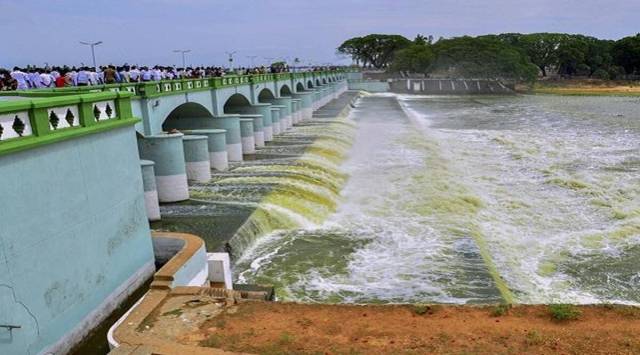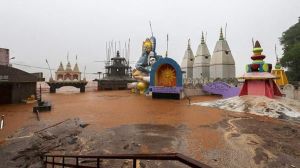Stay updated with the latest - Click here to follow us on Instagram
Mekedatu project will aggravate water crisis: IISc faculty
Dr TV Ramachandra suggested that the government should instead focus on rainwater harvesting.
 Mekedatu is a drinking and power project, where a balancing reservoir will be built near Kanakapura in Ramanagara district of Karnataka. (PTI/File Photo)
Mekedatu is a drinking and power project, where a balancing reservoir will be built near Kanakapura in Ramanagara district of Karnataka. (PTI/File Photo)Dr TV Ramachandra, a faculty at the Centre for Ecological Sciences under the Indian Institute of Science (IISc), has said that the Mekedatu project will aggravate the water crisis in the region.
Speaking to indianexpress.com on the occasion of the World Water Day, Ramchandra said, “The project would submerge 5,500 hectares of prime forest, of which 3,500 hectares are in the Cauvery wildlife sanctuary. These forests have been helping in the infiltration of water to an extent of about 90-100 TMC. So, we are essentially submerging an invaluable forest ecosystem to construct a dam that stores 65 TMC. The main agenda is to loot natural resources and not solve any problem. Forest ecosystems provide services to an extent of Rs 7 to 8 lakhs per hectare per year (provisioning, regulating and cultural services). These ecosystems sequester carbon and minimise greenhouse gas (GHG) footprints. The government should take up sustainable options at decentralised levels and refrain from further degrading our ecosystems.”
“Bengaluru is facing water scarcity as well as oxygen deficiency due to 1,055 per cent increase in concrete areas with 88% loss of vegetation cover and 79% loss of waterbodies. This has drastically reduced the water infiltration and water retention capability, evident from depleting groundwater levels in the city. For example, removal of a lake in the Nagashettihalli region in the 1980s led to the depletion of groundwater table from 100 feet to 600 feet in just five years and today, people have dug wells up to 1,900 feet and still there is no water,” he added.
Ramchandra suggested that the government should instead focus on rainwater harvesting. “For example, Bangalore receives an annual rainfall of 700 to 850 mm which amounts to 15 TMC, while water requirement for Bangalore is 18 TMC, which means 70 per cent of water required for Bangalore is available in the form of rain. The best options are rooftop harvesting, which the government needs to make mandatory, and the next best option is to rejuvenate lakes and retain rainwater in lakes so that groundwater sources have clean water. For this, we have to ensure that lakes do not receive either untreated sewage or untreated industrial effluents and we need to punish all polluters as per the provisions of the Water Act, 1974 and Environment Act, 1986,” the IISc professor elaborated.
Ram Prasad, a co-founder of Friends of Lakes, said, “The recharge well is also a very powerful tool to manage groundwater, especially when we talk about a city like Bengaluru. These wells help in controlling urban floods, among others. It also helps in the revival of the shallow unconfined aquifer which has been the city’s source of domestic water… Moreover, the statistics of the groundwater table should be released frequently so that people realise that we do not have unlimited natural resources.”
Another lake conservationist Raghavendra B Pachhapur stated it is imperative to revive the storm water drains and fence them.
“Prepare our local area drains to collect rainwater and facilitate its transportation to the nearest lake. The water quality in lakes should be maintained at Class D, which is prescribed by the Central Pollution Control Board,” he said.







